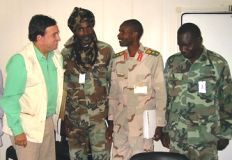US governor urges on Darfur rebels to join peace deal
Jan 9, 2007 (KHARTOUM) — Prominent US governor Bill Richardson returned from Sudan’s war-torn Darfur to the capital Khartoum calling on recalcitrant rebels to sign up to a peace deal agreed last year.
 “We stressed to the rebels the need to be part of the peace process,” Richardson said on his return from Darfur where war has killed 200,000 and displaced two million more in nearly four years, according to UN figures disputed by the Sudanese authorities.
“We stressed to the rebels the need to be part of the peace process,” Richardson said on his return from Darfur where war has killed 200,000 and displaced two million more in nearly four years, according to UN figures disputed by the Sudanese authorities.
“We spoke to the key players among the rebel groups and we conveyed a strong message: become signatories of the DPA, be part of the peace process and stop the violence,” he said, referring to the Darfur Peace Agreement inked in Abuja in May.
The Khartoum government signed the peace agreement with the main faction of the Sudan Liberation Movement/Army led by Minni Minnawi, but others — including an SLA faction led by Abdel Wahid Nur, and the Justice and Equality Movement — refused to put their names to the pact.
Richardson, governor of the state of New Mexico and a seasoned international envoy, arrived in Khartoum on Sunday on behalf of the Save Darfur coalition in a bid to persuade Sudan to accept a joint African Union-United Nations peacekeeping force to halt violence in the region.
The governor was due to meet later with UN interim special representative for Sudan Jan Eliasson who arrived in Khartoum on Tuesday with the stated intent of getting rebels to sign the peace deal.
The war in Darfur erupted in February 2003 when rebels from minority tribes in the vast western province took up arms to demand an equal share of national resources, prompting a heavy-handed crackdown from Sudanese government forces and their Janjaweed proxy militia.
Richardson, who is often mentioned as a possible 2008 Democratic presidential candidate, has a long history of dealing with foreign leaders not friendly to the West.
In 1995, he negotiated with then-Iraqi president Saddam Hussein the release of two US aerospace workers who had been captured by the Iraqis after wandering over the Kuwaiti border.
The next year he worked in Sudan, when he secured the release of an American pilot and two Red Cross workers who were being held hostage by Sudanese rebels.
Last September, he successfully negotiated with Sudanese President Omar al-Beshir the release of Chicago Tribune reporter Paul Salopek, who was being held in a Sudanese prison on espionage charges.
(AFP)
